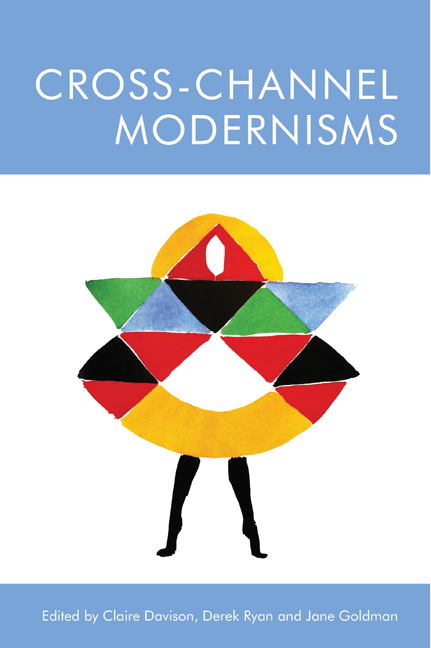Book contents
- Frontmatter
- Contents
- List of Figures
- Notes on Contributors
- Introduction: Cross-Channel (Transmanche) Modernisms
- Interlude: Translating
- 1 On Unknowing French? Rhythm and Le Rythme on a Cross-Channel Exchange
- 2 Impressions of Translation: Ford Madox Ford’s Cosmopolitan Literary Crossings
- 3 Sydney Schiff and Marcel Proust: Table-talk, Tribute, Translation
- Interlude: Fashioning
- 4 Cross-Channel Modernisms and the Vicissitudes of a Laughing Torso: Nina Hamnett, Artist, Bohemian and Writer in London and Paris
- 5 Jean Rhys’s comédie anglaise
- 6 Betray to Become: Departure in James Joyce’s A Portrait of the Artist as a Young Man
- Interlude: Mediating
- 7 Close Up and Cross-Channel Cinema Culture
- 8 Debussy at the Omega Workshops
- 9 Across the Other Channel: Elizabeth Bowen and Modernist Mediation
- Coda: ‘You, who cross the Channel’: Virginia Woolf, Departures and the Spectro-Aesthetics of Modernism 215
- Index
Interlude: Mediating
Published online by Cambridge University Press: 03 October 2020
- Frontmatter
- Contents
- List of Figures
- Notes on Contributors
- Introduction: Cross-Channel (Transmanche) Modernisms
- Interlude: Translating
- 1 On Unknowing French? Rhythm and Le Rythme on a Cross-Channel Exchange
- 2 Impressions of Translation: Ford Madox Ford’s Cosmopolitan Literary Crossings
- 3 Sydney Schiff and Marcel Proust: Table-talk, Tribute, Translation
- Interlude: Fashioning
- 4 Cross-Channel Modernisms and the Vicissitudes of a Laughing Torso: Nina Hamnett, Artist, Bohemian and Writer in London and Paris
- 5 Jean Rhys’s comédie anglaise
- 6 Betray to Become: Departure in James Joyce’s A Portrait of the Artist as a Young Man
- Interlude: Mediating
- 7 Close Up and Cross-Channel Cinema Culture
- 8 Debussy at the Omega Workshops
- 9 Across the Other Channel: Elizabeth Bowen and Modernist Mediation
- Coda: ‘You, who cross the Channel’: Virginia Woolf, Departures and the Spectro-Aesthetics of Modernism 215
- Index
Summary
When we hit the English Channel that night, choppy and wind-blown as it was, I began to be seasick for the first and only time in my life. But I thought I was going to die. I rocked! And the sea rocked! And the boat rocked! And the world went round and round! When we got out of the Channel, we ran into one of those North Atlantic gales that lasted half-way to New York. And for over a week, every time the boat would sway, my stomach would sway, too. That cured me of ever again drinking too much gin. (Hughes 1993: 140)
Modernist Channel crossings may sometimes become narrow straits, a sort of critical shorthand for experimental exchanges between London and Paris. And traffic may in some received opinion likewise be considered preponderantly one way, particularly in view of Paris's postwar status in 1919 as the locus for the Peace Conference, and therefore for a while capital city of the political world, as well as the capital city of the international, transnational, cultural avant-gardes. But, recalling a nauseating and hungover Channel crossing, rough in many senses (see Virginia Woolf's hilarious cross-Channel mistranslation of this word cited in our Introduction [Woolf 1975–80, vol. 4: 197]) and made while he was working on ‘a big, clean-looking freighter’ on a regular run between Rotterdam and New York (1993: 139), Langston Hughes reminds us, in an aqueous autobiography, The Big Sea (1940), that it is possible to cross through the English Channel in many other directions too, and not only to other European destinations besides France and Belgium, the amorphous ‘Flanders’, metonym for all the Great War battlefields. For the English Channel/French ‘la Manche’ in fact mediates in the east with the North Sea (also the site of huge naval conflict), which incidentally was known until the Great War as the German Ocean on British and German maps alike (see Scully 2009), and hence east to Scandinavia and Russia, and in the west with the Celtic and Irish seas and the Atlantic Ocean.
- Type
- Chapter
- Information
- Cross-Channel Modernisms , pp. 155 - 161Publisher: Edinburgh University PressPrint publication year: 2020



